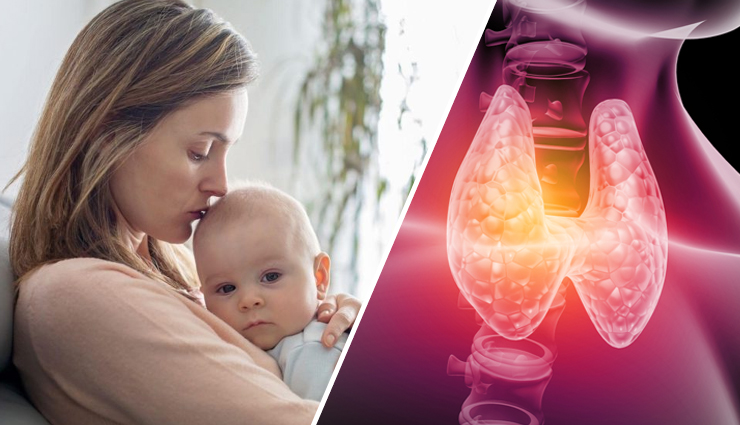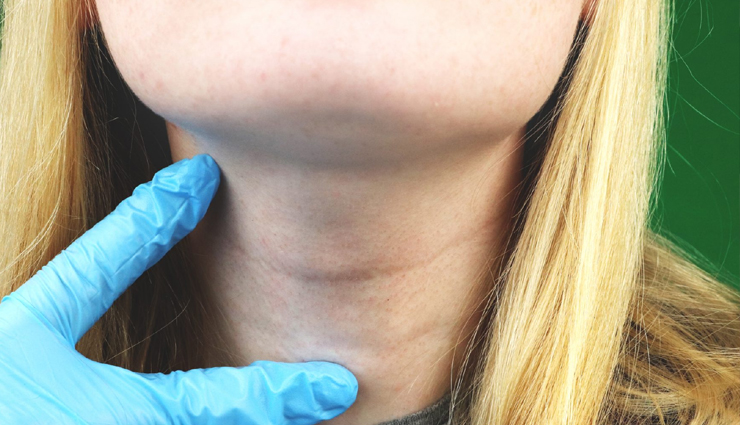- Home›
- Healthy Living›
- What Is Postpartum Thyroiditis? Key Symptoms And Treatment
What Is Postpartum Thyroiditis? Key Symptoms And Treatment
By: Priyanka Maheshwari Mon, 21 Aug 2023 09:23:24

Postpartum thyroiditis is a condition that affects the thyroid gland, which is a butterfly-shaped gland located in the neck and responsible for producing hormones that regulate metabolism and other bodily functions. This condition occurs in some women after they give birth, usually within the first year after childbirth.
Postpartum thyroiditis is believed to be an autoimmune disorder, meaning that the body's immune system mistakenly attacks the thyroid tissue. It typically progresses through three phases:
* Hyperthyroidism
In the initial phase, the immune response causes the thyroid gland to become inflamed, leading to an excess release of thyroid hormones into the bloodstream. This results in symptoms of hyperthyroidism, such as anxiety, irritability, rapid heartbeat, weight loss, and heat intolerance.
* Hypothyroidism
After the hyperthyroid phase, the inflammation can cause damage to thyroid cells, leading to a decrease in thyroid hormone production. This results in symptoms of hypothyroidism, including fatigue, weight gain, depression, cold sensitivity, and hair loss.
* Recovery
Many women with postpartum thyroiditis eventually recover and return to normal thyroid function within a year or so after the onset of symptoms. However, some women may develop permanent hypothyroidism and require ongoing thyroid hormone replacement therapy.
The exact cause of postpartum thyroiditis is not fully understood, but it is thought to be related to the changes in the immune system that occur during pregnancy and after childbirth. Women with a history of autoimmune disorders, such as Hashimoto's thyroiditis or Graves' disease, are at a higher risk of developing postpartum thyroiditis.
If you suspect you might have postpartum thyroiditis or are experiencing symptoms related to thyroid dysfunction after giving birth, it's important to consult a healthcare professional for proper diagnosis and management. Thyroid function tests, such as measuring levels of thyroid hormones (TSH, T3, T4), can help determine the appropriate treatment approach.

Symptoms of Postpartum Thyroiditis
The symptoms of postpartum thyroiditis can vary depending on the phase of the condition (hyperthyroidism, hypothyroidism, or recovery). Keep in mind that not all women will experience all of these symptoms, and the severity can vary from person to person. Here are the common symptoms associated with each phase:
* Hyperthyroidism Phase:
Anxiety and irritability
Restlessness
Rapid heartbeat (palpitations)
Tremors
Heat intolerance
Weight loss despite increased appetite
Increased sweating
Insomnia
Fatigue
* Hypothyroidism Phase:
Fatigue and lethargy
Depression
Weight gain
Cold sensitivity
Dry skin
Constipation
Muscle aches and weakness
Hair loss
Memory and concentration difficulties
Menstrual irregularities
* Recovery Phase:
Gradual improvement in symptoms
Return to more normal thyroid function
May still experience some residual symptoms of either hyperthyroidism or hypothyroidism
It's important to note that these symptoms can be quite similar to those of other postpartum conditions and mood disorders, which can make diagnosis challenging. If you suspect you might have postpartum thyroiditis or are experiencing any of these symptoms, it's crucial to consult a healthcare professional for proper evaluation and diagnosis. A doctor can conduct appropriate tests, such as thyroid function tests and antibody tests, to determine if postpartum thyroiditis is the cause of your symptoms. This will help guide the appropriate treatment and management plan for your specific situation.

Treatment of Postpartum Thyroiditis
The treatment of postpartum thyroiditis depends on the phase and severity of the condition. Generally, the treatment approach focuses on managing the symptoms and providing support while the thyroid gland recovers. Here's how each phase may be managed:
* Hyperthyroidism Phase:
- If the hyperthyroid symptoms are severe, a healthcare provider might prescribe beta-blocker medications to help alleviate symptoms such as rapid heartbeat, tremors, and anxiety.
- In some cases, if the hyperthyroidism is particularly problematic, antithyroid medications might be considered, although this is less common in postpartum thyroiditis compared to conditions like Graves' disease.
* Hypothyroidism Phase:
- If hypothyroidism develops, thyroid hormone replacement therapy with synthetic thyroid hormones (levothyroxine) may be prescribed to restore normal thyroid function.
- The dosage of levothyroxine will be adjusted based on blood tests that monitor thyroid hormone levels.
* Recovery Phase:
- As the thyroid gland starts to recover and return to normal function, the healthcare provider will monitor thyroid hormone levels through periodic blood tests.
- The treatment plan may be adjusted based on these test results and the patient's overall condition.
It's important to note that in many cases, postpartum thyroiditis is a self-limiting condition, meaning that it resolves on its own over time without the need for long-term treatment. Many women experience a complete recovery and return to normal thyroid function within a year after the onset of symptoms. However, in some cases, the hypothyroidism may become permanent, necessitating ongoing thyroid hormone replacement therapy.





